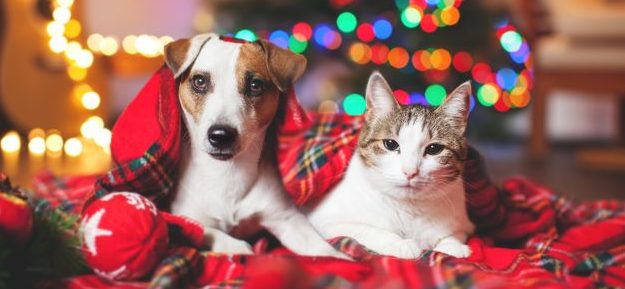November 26, 2024 | News
Keeping cats and dogs safe this Christmas

Christmas is a time being merry, but lots of our favourite festive items aren’t good for our furry friends. Here’s some top tips for keeping your cats and dogs safe this Christmas:
Cats
- Tinsel and decorations can be dangerous if swallowed
- Curious cats trying to climb Christmas trees are at risk of injury
- The oils produced by some real Christmas trees are mildly toxic and can irritate your cat’s mouth and stomach
- Secure trees and decorations where possible and place decorations higher up on the tree – away from those little paws!
- Snow globes shouldn’t be kept anywhere where they can be knocked over and smashed, as they can contain a chemical called ethylene glycol, otherwise known as antifreeze, which is highly poisonous to cats.
- Poinsettia, lilies, holly, mistletoe and amaryllis plants are all either poisonous or toxic to cats
- Some foods – for example onions (including onion gravy), garlic, raisins, grapes, chocolate – and alcohol are also poisonous to our feline friends
- Lots of visitors and a change to routine can be stressful for cats at Christmas. You can ease their stress by providing hiding places for them and using sprays or diffusers which release comforting pheromones.
- For more information you can watch this video from our member Blue Cross: https://youtu.be/7EMiLXAmTFM

Dogs
- Lots of our favourite festive foods are toxic to our dogs and should be kept well out of paws reach, including:
- Chocolate – chocolate is toxic to dogs and even small amounts can cause serious illness.
- Christmas pudding and mince pies – grapes and dried vine fruits, including currants, sultanas and raisins, can cause severe kidney failure if eaten.
- Onions (and garlic, leeks, shallots and chives) – these all belong to the allium species of plant and are poisonous to dogs whether cooked or uncooked.
- Alcohol – alcohol has a similar effect in dogs as it does in their owners. Make sure your dog can’t help themselves to any unattended alcohol left lying around.
- Macadamia nuts – macadamia nuts can cause lethargy (tiredness), weakness in the back legs, increased body temperature, tremors and stiffness.
- Leftovers – don’t be tempted to give your dog leftover Christmas food – they can include hidden ingredients toxic to dogs and mould in leftovers can make them ill.
- Sweets – many of the sweets we eat over Christmas, such as candy canes, contain a sugar-free sweetener called xylitol, which is poisonous to dogs.
- If you have a dog but would like a real Christmas tree, you can opt for a non-drop variety as that helps ensure dropped needles don’t hurt their paws or cause mild stomach upset if eaten.
- Decorations such as baubles and tinsel can cause a dangerous stomach blockage if swallowed. Hang Christmas tree decorations up high to prevent mischievous paws (or tails) from knocking them off and remember to never hang chocolate decorations as chocolate is poisonous to dogs.
- Christmas presents lying under the tree can be too tempting for our four-legged friends – especially if the gift is edible! It’s best to keep wrapped gifts out of paws reach, as wrapping paper can cause a blockage in your dog’s tummy if too much is eaten.
- The wires on fairy lights can be tempting for your dog to chew. Keep any cables out of your dog’s reach and remember to switch them off at the mains when they’re not in use.
- Christmas plants make the season all the more festive, but poinsettia, holly, mistletoe, ivy and potpourri are all toxic to dogs.
- Christmas brings with it lots of guests, but too many can be stressful for your dog. It’s best to prepare for visitors before they arrive, by providing a safe space for your dog to retreat. This could be a quiet room or a den – just make sure it’s somewhere where your dog can’t be disturbed, and remember to provide them with their food, water and any familiar toys, so they have everything they need in their safe space. This also applies if other pets are visiting your home.



